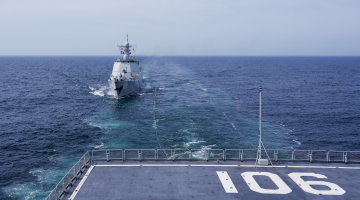By Tang Tianbo
As China has successfully facilitated the dialogue between Saudi Arabia and Iran in Beijing and the restoration of Saudi-Iranian diplomatic relations, there is a round of reconciliation wave in the Middle East that has attracted worldwide attention. Egypt and Turkey will restore diplomatic relations to the ambassadorial level, the peace process in Yemen has achieved positive progress, the resumption of diplomatic relations between Qatar, Bahrain, and the United Arab Emirates has made actual progress, and Arab League has re-admitted Syria...The Middle East, which has always been clouded by war, will continue to usher in the dawn of peaceful development in 2023.
Increased strategic autonomy willingness
Behind this wave of reconciliation are the rising awareness of Middle East countries seeking development and cooperation and strengthening their strategic autonomy. Against this background, the pattern in the Middle East is undergoing profound adjustments.
From an internal perspective, countries in the Middle East that have experienced years of wars have realized that it is difficult to gain benefits from armed conflicts and diplomatic struggles, so they have shifted their policy focus to developing the economy, improving people's livelihood, and promoting cooperation. For example, after several years of fighting in Yemen, all parties to the conflict are currently unable to launch large-scale offensives. In October 2022, the temporary ceasefire agreement in Yemen expired, but all parties tacitly continued the ceasefire.
To create a relatively stable external environment as soon as possible, the urgency for Saudi Arabia to seek reconciliation with Iran has clearly increased. Iran no longer expects to reach a new nuclear agreement with the US in exchange for sanctions relief, so it is turning to improve relations with relevant countries to create space for economic development.
From an external perspective, the US's strategic contraction in the Middle East has greatly stimulated the strategic autonomy and diplomatic easing of regional countries. For years, the US has repeatedly intervened in Middle Eastern affairs and rarely advocated for peace and dialogue. What the US really pursues is its own geopolitical or economic interests. As a result, some countries in the Middle East have gradually realized that the US longstanding Middle East policy will not bring true benefits to the region.
This is particularly evident in the case of Saudi Arabia. The cooperation between Saudi Arabia and the US has long been built on the foundation of "oil for security." However, the US has repeatedly disappointed Saudi Arabia in security matters in recent years. In 2019, Saudi Arabia's critical oil facilities were attacked, which caused a significant reduction in oil production. Saudi public opinion called on the US to provide security guarantees, but the US remained indifferent. Saudi Arabia faced frequent cross-border attacks in 2022. However, the US actually reduced its defense deployments in Saudi Arabia. Disappointed with the US, Saudi Arabia has simultaneously rejected US requests to increase oil production and has started to independently explore diplomatic avenuesto improve its relations with Iran and Syria.
Cautiously optimistic development prospects
The current round wave of reconciliation in the Middle East is quite large in scope and magnitude, and it will surely become a new beginning of peace and development in the region.
On the one hand, economic development and social stability are goals that Middle Eastern countries attach great importance to. Since the "Arab Spring", countries in the Middle East have experienced more than 10 years of turmoil, and their will to achieve economic development and stability is becoming stronger. In addition, the stalemate in the current war situation will also restrain the impulse of military confrontation. The consideration of stopping losses by regional countries will overwhelm the logic of winning wars to some extent, which makes diplomatic dialogue more attractive than military confrontation.
On the other hand, China insists on mediating regional conflicts by advocating peace talks and promoting regional stability through peaceful development. China has provided its solutions for Middle East countries to maintain regional peace, eliminate the root causes of conflicts, and achieve long-term peace and stability, which has been widely appreciated by Middle East countries. China will continue to make sincere contributions to the realization of peace and development in the Middle East after successfully promoting the resumption of diplomatic relations between Saudi Arabia and Iran.
However, we must also realize that there are many obstacles on the road to promoting reconciliation in the Middle East. In particular, the US is not willing to see the decline of its influence in the region and still insists on tough policies and sanctions against Iran, Syria and other countries. This seriously affects the local economic and social development and the improvement of people's livelihoods. Nevertheless, as stated in an article by Iran's Mehr News Agency, there are various signs that the era of unilateralism is coming to an end, and a new world and world order are taking shape.
(The author is an associate researcher at the Institute of Middle East Studies, China Institutes of Contemporary International Relations).









